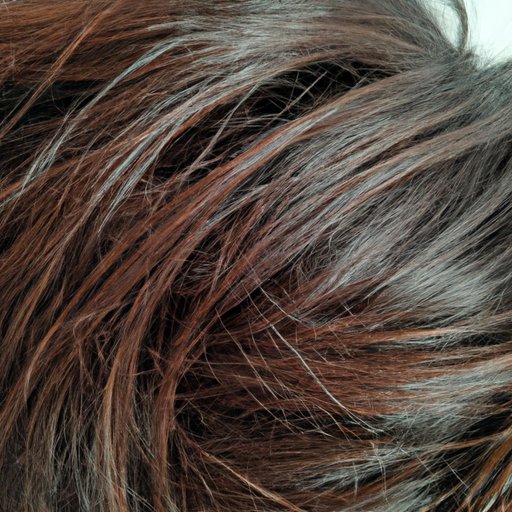Introduction
Greasy and oily hair is a common issue that many of us experience, often causing us to feel frustrated, self-conscious, and less-than-confident. While it may seem like a small problem, greasy hair can have a big impact on our day-to-day lives and how we feel about ourselves. So why does it happen, and what can we do about it? In this article, we will explore the causes and solutions for greasy hair, offer tips and tricks for managing greasiness, and even discuss what your hair may be saying about your overall health.
Causes and Solutions for Greasy Hair: An In-Depth Guide
One of the main causes of greasy hair is overactive sebaceous glands, which produce sebum, a natural oil that helps keep hair and skin healthy and moisturized. While sebum is a good thing, too much of it can cause hair to look greasy, dull, and lifeless. Additionally, product buildup, hormonal imbalances, and even certain medications can contribute to greasiness.
The good news is that there are several solutions to combat greasy hair. Adjusting your hair care routine can make a big difference, such as using a gentle, clarifying shampoo to remove excess oil, avoiding heavy styling products, and washing your hair less frequently (yes, really!). Specific hair care products, such as oil-absorbing powders, can also be helpful in managing greasy hair. Lastly, making lifestyle changes, such as eating a healthy diet and reducing stress, can help regulate sebum production and promote overall hair health.
Greasy Hair Woes: How to Keep Your Locks Luscious and Oil-Free
While greasy hair can be frustrating, there are ways to keep your locks looking fabulous. For example, choosing the right shampoo and conditioner can make a big difference, such as opting for products that are designed specifically for oily hair and contain gentle, clarifying ingredients. Additionally, using dry shampoo in between washes can help absorb excess oil and add volume and texture to your hair. Avoiding certain styling products, such as heavy mousses and gels, can also be helpful in managing greasiness.
Understanding the Science of Greasy Hair and How to Fix It
To truly understand why hair gets greasy, it’s important to understand the science behind it. For example, sebum is produced by the sebaceous glands, which are located near the hair follicles. Factors such as genetics, hormones, and even the weather can affect how much sebum is produced. Additionally, the hair’s natural pH balance can also play a role in how oily it appears. Understanding these factors can help you better choose the right solutions for your hair type and lifestyle.
The Ultimate Greasy Hair Survival Guide: Tips, Tricks, and Products
In addition to adjusting your hair care routine and making lifestyle changes, there are several tips and tricks that can help you manage greasy hair. For example, eating a healthy diet rich in vitamins and nutrients can promote overall hair health, while reducing stress can help regulate sebum production. Natural remedies, such as rinsing your hair with apple cider vinegar or using baking soda as a scalp scrub, can also be helpful in managing greasiness. Additionally, there are several hair care products that are designed specifically for oily hair, such as clarifying shampoos, scalp treatments, and oil-absorbing powders.
What Your Hair Says About Your Health: Decoding Greasy Hair and Finding Solutions
Believe it or not, the health of your hair can often reflect your overall health. For example, greasy hair can sometimes be indicative of a larger health issue, such as a thyroid disorder or hormonal imbalance. If you suspect that your greasy hair may be related to a health issue, it’s important to talk to your doctor or healthcare provider to get the necessary tests and treatment. By addressing the underlying health issue, you can help improve the health and appearance of your hair.
Conclusion
Greasiness can be a frustrating and challenging issue to deal with, but by understanding the causes and solutions, you can take control of your hair and get it looking fabulous and oil-free. From adjusting your hair care routine to making lifestyle changes to finding the right products, there are many steps you can take to manage greasy hair. By taking care of your hair, you can feel more confident, self-assured, and ready to take on the world.
